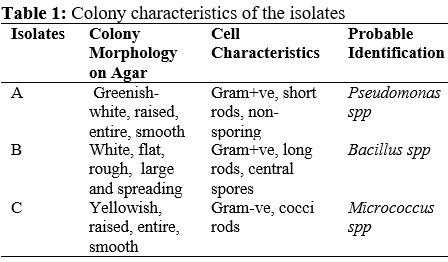Response of Bacillus subtilis to Salt and Acid Stresses and the Optimal Effect on Fermentation of Locust Bean (Parkia biglobosa) Seeds into Iru (A Soup Condiment)
DOI:
https://doi.org/10.54117/ijamb.v2i1.8Keywords:
Bacillus subtilis, salt and acid stresses, locust bean fermentation, iru quality, acceptabilityAbstract
This study aimed at evaluating the performance of Bacillus subtilis stressed in varying single-factor salt and acid concentrations as pre-treatments in the fermentation of African locust bean seeds (Parkia biglobosa) into iru, a commonly consumed soup condiment. Microorganisms were isolated from commercial iru and the result showed that there was a predominant bacteria growth, with a mild mold growth. The bacteria isolated were species of Bacillus, Micrococcus and Pseudomonas. Biochemical tests were carried out on the Bacilus species; and Bacillus subtilis was isolated and identified. The isolated B. subtilis was cultured under different acid (pH 3.5, 4.5 and 5.5) and salt (1%, 2.5% and 5% NaCl) concentrations. Notable growths were seen at all salt concentrations but no growth was observed at very high acid concentrations (pH 3.5 and 4.5). Isolates from varying cultural conditions were used as single starters to ferment the locust bean seeds into iru (at 37 oC for 72 h), with subsequent evaluation of their performance in the fermentation process and final product. The results revealed that stressing the organism as a pretreatment step had a positive significant effect on the nutritional, antinutritional, physicochemical, and sensory properties of the fermented iru. This study therefore concludes that the introduction of appropriate starter culture such as B. subtilis with appropriate modifications could contribute to improved preservation, quality and safety of traditionally fermented foods. The overall acceptability of the samples fermented with the stressed B. subtilis compared favourably with the control samples.

Downloads
Published
How to Cite
Issue
Section
License
Copyright (c) 2023 Victor Enujiugha, Oluwatoyin, Deborah, Margaret, James

This work is licensed under a Creative Commons Attribution 4.0 International License.
